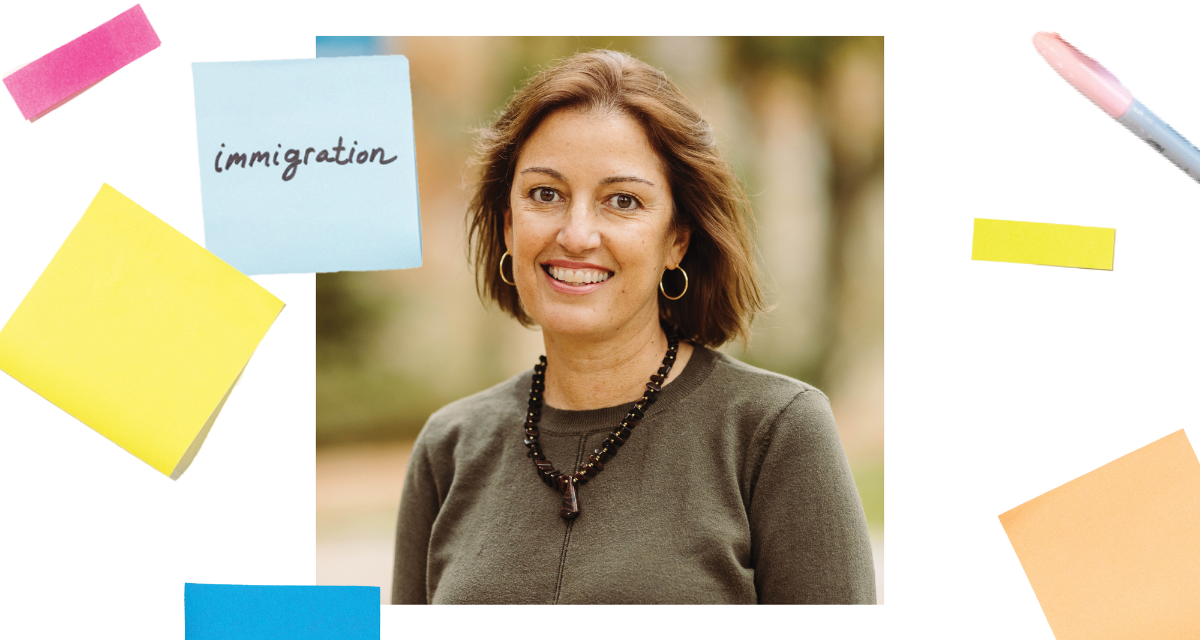What has faith to do with immigration?
A version of this article by Dr. Ruth Melkonian Hoover, professor of political science, originally appeared in the spring 2023 issue of STILLPOINT magazine.
For some, it is their faith and faith community that sustains them in the process of dislocation and relocation. For others, it is their faith that makes them a target, particularly religious minorities. Both were true for my grandparents when they fled the genocide of Armenian Christians by the Turks of the Ottoman Empire in the WWI era. They found refuge in the nearby island nation of Cyprus and built a new life there, in a growing Armenian diasporic neighborhood within Larnaca. They had a supportive school, church and jobs, where they could finally emphasize the Armenian language and culture (denied under the Ottomans).
A year ago, I had the privilege of visiting Cyprus, interviewing Armenian Cypriots, and touring my family’s neighborhood, church and school. I have been writing on immigration and religion for some time and am now seeking to better understand my own family’s experience of genocide and migration, relocation, faith and hope.
In interviews, Armenian Cypriots shared that the 1950s was something of a sweet spot, a time of relative peace and harmony between Greek, Turkish and Armenian Cypriots. They lived, played, ate and went to school together; some even worshipped together. However, after Cyprus successfully gained independence from Britain in 1960, conflict soon arose between Turks and Greeks in the 1960s and 1970s, and most Armenian Cypriots were again forced to relocate. All of that which had been built up by Armenian Cypriots was slowly pulled apart. Fearing they would become targets for violence once again, many Armenians left Cyprus. My relatives settled in the U.S.
The faith that made them a target also sustained them in the rebuilding of a new home in the U.S. My family, Armenian Protestants, settled into American Protestant churches. Most of my extended family members married other Armenians, helping retain the culture and language. By contrast, my own father married a Dane. After working as missionaries in India and then Lebanon (where my siblings attended Armenian schools), my immediate family settled in California, where we all spoke English to fit in and acclimate to the U.S.
We children grew up with a sense of suffering without speaking of it. Our grandparents didn’t talk with us about the genocide or the pressure to leave Cyprus, exacerbated by ongoing language barriers. Yet, some of my Dad’s generation struggled with the loss of leaving Cyprus—recalling a time before the island split in 1974, a time in which there had been greater harmony and welcome.
Growing up, my father was strict, old world in many ways, but not defined by rage. Throughout his life, he was eager to engage with Turks—as an opportunity to witness of God’s love. His recognition of the depravity of sin, and the capacity of each one of us to inflict great harm, in conjunction with the depth of God’s love and grace, made it easier for him to extend grace.
In my study of my family’s trajectory, and this region, I have been heartened by the role of grace, truth-telling and forgiveness. I am grateful for the possibility of migration, the opportunity for new starts. And I do not want to forget the pain that often necessitates relocation. I want to continue along the path of forgiveness and further the work of reconciliation (even when other side may not acknowledge the atrocity). I am thankful for the life of my father, his faithful and counter-cultural way of being and living and loving—not othering, not sinking into zero sum tribalism but rather living a life of hospitality, welcoming newcomers, as he and his family once were. His faith helped him transcend common cycles of bitterness, embrace hope and practice hospitality.
 The Bell
The Bell